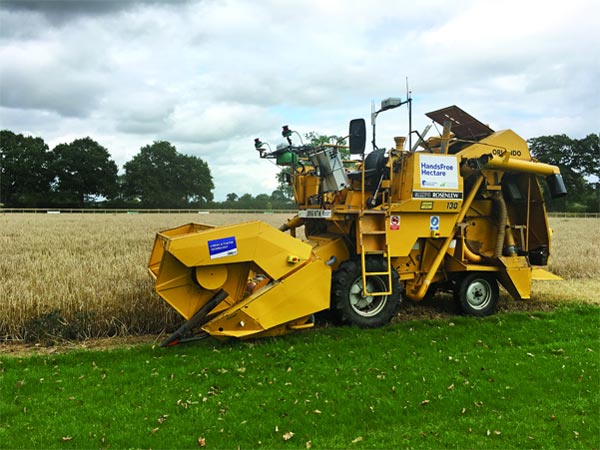Farmers Weekly,
6 September 2017
The groundbreaking Hands Free Hectare project has just seen its first harvest. This £200,000 Innovation UK-funded project by Harper Adams University with Precision Decisions has modified existing machinery to drill, sow, spray and harvest the crop without any human control. The project aims to show how automation can facilitate a sustainable farming system where multiple smaller, lighter machines will enter the field, minimising the level of compaction (SDG 15, life on land and SDG 9, industry, innovation and infrastructure).
ICIS,
Special Report, 3 July 2016
Growing demands from brand owners and consumers for fibres and textiles that are more environmentally friendly are now creating a huge market for bio-based polymers produced using renewable feedstocks. The textile and packaging industries have a significant impact on the environment: this report highlights how recent developments in new materials support SDG 9 Industry, Innovation and Infrastructure, and SDG 7 Affordable and Clean Energy.
Elsevier,
Qing Chang,
Chapter 11 - Emulsion, Foam, and Gel,
Editor(s): Qing Chang,
Colloid and Interface Chemistry for Water Quality Control,
Academic Press,
2016,
Pages 227-245,
ISBN 9780128093153
Supports SDG 6 by discussing the application of colloid and surface chemistry in water and wastewater treatment- the only book of its kind to do this.
A guide to the drivers, opportunities, challenges and implementation steps for small and medium-sized enterprises (SMEs) looking to adopt traceability in their supply chains, focussing on Goal 8
The discussion links Principle 5 of the Women’s Empowerment Principles (WEPs), which encourages companies to expand on their business connections with women-owned enterprises, to advance Goal 5
ICIS,
ICIS AFPM Supplement 2016, March 2016
More women are entering the oil and gas and petrochemical sectors – but there’s still a way to go. It’s all part of a wider drive to increase diversity in the workforce. This is important for advancing SDG 5.1 to end all forms of discrimination against all women and girls everywhere and SDG 5.5 to ensure women’s full and effective participation and equal opportunities for leadership at all levels of decision-making in political, economic and public life.
This series examines trends in participation in the Caring for Climate initiative, including emissions performance of companies, as well as progress companies have made against the five commitments endorsed by all signatories in the Caring for Climate Leadership Statement. By providing this analysis, Caring for Climate seeks to remind signatories of their progress towards a building a low-carbon society and to encourage greater participation in the initiative, supporting goals 12,13,14 and 15.
This report provides an overview on how to do business with respect to children's right to be free from child labour, with the aim to improve global supply chain governance, due diligence and remediation processes to advance the progressive elimination of child labour. This report relates to Goal 8 and Goal 10.
Linking to Goal 10, this infographic highlights the human rights dimension of each Sustainable Development Goal, by indicating the relevant international human rights instrument that applies.
Linking to Goal 13, this report assesses the contribution of business-focused initiatives of the Global Climate Action Agenda to achieving the goals of the Paris Agreement and the 2030 Agenda for Sustainable Development. By providing this analysis, the report seeks to catalyse business action on climate change and the Sustainable Development Goals (SDGs) and demonstrate the potential collective impact of the assessed initiatives on emissions



